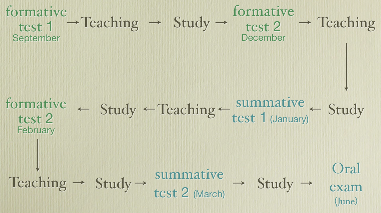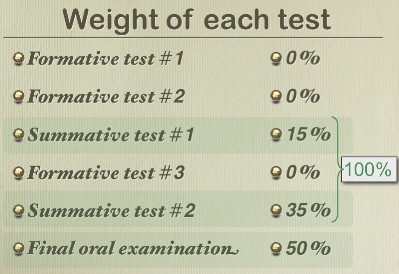Posts filed under ‘degree of certitude’
Definition of certainty
Introduction
This is not a “new pedagogical” word. It has been used for a long time, 14th century. The word is coming from certain (13th century), from Latin certus, from past participle of cernere: to sift, discern, decide; akin to Greek krinein to separate, decide, judge. Its meaning is related to fixed, settled, dependable, reliable, known or proved to be true, indisputable, assured in mind or action.
Defintions
Several definitions exist on the web like
- Something that is clearly established or assured (from the The American Heritage® Dictionary of the English Language, Fourth Edition copyright ©2000 by Houghton Mifflin Company. Updated in 2003. Published by Houghton Mifflin Company.)
- Something that is certain. The quality or state of being certain especially on the basis of evidence. (Merriam-Webster Online dictionary, last consulted on 25th oct 2007)
- Synonyms from the Merriam-Webster online dictionary: certainty, certitude, conviction mean a state of being free from doubt.
- certainty and certitude are very close;
- certainty may stress the existence of objective proof <claims that cannot be confirmed with scientific certainty>, while
- certitude may emphasize a faith in something not needing or not capable of proof <believes with certitude in an afterlife>.
- conviction applies especially to belief strongly held by an individual <holds firm convictions on every issue>.
- Synonyms from the Freedictionary: certainty, certitude, assurance, conviction : These nouns mean freedom from doubt.
- Certainty implies a thorough consideration of evidence: “the emphasis of a certainty that is not impaired by any shade of doubt” Mark Twain.
- Certitude is based more on personal belief than on objective facts: “Certitude is not the test of certainty” Oliver Wendell Holmes, Jr.
- Assurance is a feeling of confidence resulting from subjective experience: “There is no such thing as absolute certainty, but there is assurance sufficient for the purposes of human life” John Stuart Mill.
- Conviction arises from the vanquishing of doubt: “His religion . . . was substantial and concrete, made up of good, hard convictions and opinions.” Willa Cather.
- Certainty is not defined in information theory. However, Claude Shannon, the inventor of the information theory, discovered that uncertainty can be measured . Uncertainty is a logarithmic measure of the average number of choices that a receiver or a molecular machine like a human being has available. The best measure for certainty is a decrease of uncertainty, and this is Shannon’s information measure. The uncertainty before an event less the uncertainty after the event (equivocation) is the information.
- There is also a “Legal” definition: Moral certainty is the conclusion which can be arrived after considering the evidence available that the defended is guilty of the crime. Moral certainty is the state of belief one can arrive after applying a reasonable doubt on the matter under consideration.
The Freedictionary provides words in relation with certainty
- cognitive state, state of mind – the state of a person’s cognitive processes.
- confidence, self-assurance, self-confidence, sureness, assurance, authority – freedom from doubt; belief in yourself and your abilities; “his assurance in his superiority did not make him popular”; “after that failure he lost his confidence”; “she spoke with authority”.
- certitude, cocksureness, overconfidence – total certainty or greater certainty than circumstances warrant.
- reliance, trust – certainty based on past experience; “he wrote the paper with considerable reliance on the work of other scientists”; “he put more trust in his own two legs than in the gun”.
- doubt, doubtfulness, dubiety, dubiousness, incertitude, uncertainty – the state of being unsure of something.
Words like realism, sure, imprudence and prudence should also be related to the notion of certainty.
Conclusions
- Definition of certainty is something that is clearly established, assured, leaving no place for doubt. But as Bertrant Russel stated in 1912: “Is THERE ANY KNOWLEDGE in the world which is so certain that no reasonable man could doubt it? ” (Russell, B. (1988) The Problems of Philosophy, Prometheus Books. Page 1).
- It so appears that “Degree of certitude” is more what is mesured when asking the level of confidence in a given answer. This is actually the expression used in French (Degré de certitude).

